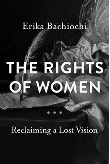The Rights Of Women: Reclaiming A Lost Vision -- By: Miles Smith
Journal: Eikon
Volume: EIKON 03:2 (Fall 2021)
Article: The Rights Of Women: Reclaiming A Lost Vision
Author: Miles Smith
Eikon 3.2 (Fall 2021) p. 125
The Rights Of Women: Reclaiming A Lost Vision
REVIEWED BY
Miles Smith is a Lecturer in History at Hillsdale College.

Erika Bachiochi. The Rights of Women: Reclaiming a Lost Vision. Notre Dame, IN: University of Notre Dame Press, 2021.
Two marches, just over one hundred years apart, mark the introduction of Erika Bachiochi’s The Rights of Women: Reclaiming a Lost Vision. The first march took place in 1913. Women gathered to make their voices heard in support of federalizing the right of women to vote in general elections. Some states gave women the right to vote in the nineteenth century; Utah allowed women to vote in 1870. Other states lagged behind and by 1913 marchers loudly — and confidently — proclaimed that women’s suffrage represented high ideals like charity, liberty, justice, peace, and hope. The second march occurred in 2017, and, as Bachiochi notes, if there were high ideals present, their impact was lost in the cacophony of explicit-filled, insulting, sensationalist, and sexualized rhetoric that asserted the coming of a generation of so-called nasty women. Bachiochi’s work offers a narrative of how conceptions of women’s rights changed in the late modern era, and what the consequences of those changes means for a substantive vision of women’s rights in modern society.
Eikon 3.2 (Fall 2021) p. 126
Bachiochi uses the figure of Mary Wollstonecraft to explain the advent of women’s rights. The British philosopher and writer pioneered the struggle for women’s rights in the United Kingdom but always maintained preeminence of what it was to be a woman in her work. Wollstonecraft, for example, argued that women should be trained for other vocations other than motherhood and that they should be educated with male peers. Her reason was not to desex women but to allow women to achieve intellectual and moral excellence as women. Wollstonecraft’s great gift to women’s rights was her conviction that education provided women the opportunity to pursue true virtue, and not mere power.
Wollstonecraft’s reputation as a revolutionary came from her willingness to rethink societal articulations regarding women’s place and role in society. She was not, however, seeking to overthrow the natural order. She hoped instead to reaffirm it by strengthening the place and station of women. Wollstonecraft believed that in human history, tensions between men and women in the practice of law, certain socio-moral strictures regarding marriage, and state mandated prescriptions on women’s status disordered women’s rightful practice of virtue and often
Click here to subscribe
